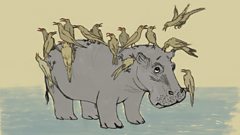Symbiosis
Aleks Krotoski discovers how to live symbiotically with our technology, and how such a relationship may change what it means to be human.
For the entirety of human history, we have made tools and those tools have then shaped us. But in the digital age, that ancient feedback loop has become more complicated.
We are fully conscious of the impact our tools can have on us, and we have the chance to guide our future symbiotic relationship with out technology, in a way that expands our cognitive capacity, creativity and skills that would make us fulfill our untapped potential as a species.
But is that possible when the vast majority of us have become detached from the development of our technology? What happens to the ancient feedback loop when we are being shaped by obscure devices, in an age of digital blackboxes?
Aleks Krotoski explores the history of how we have been shaped by tool development, and discovers how we can plug back into the process, and shape out symbiotic future.
Last on
More episodes
Previous
Next
Clip
-
![]()
The Ancient Feedback Loop
Duration: 05:32
Sougwen Chung

is an artist & researcher based in New York whose work explores human-machine collaboration and mark making as an approach to understanding the dynamics of humans and systems.
 Her multifaceted artistic practice also includes performance, installation, and drawings which have been featured in museums and galleries around the world. In her performance work she will often work with DOUG – a robot drawing collaborator which stands for Drawing Operations Unit Generations One, Two and Three. A former research fellow at the Massachusetts Institute of Technology’s Media Lab, Chung is also an inaugural member of NEW INC, the first museum-led technology and art collaboration with The New Museum in New York.
Pattie Maes

is a professor in the Media Arts and Sciences program at the Massachusetts institute of Technology focusing on human-computer interaction and AI.Β Maes and her MIT team have developed new devices to help humans perform more effectively – from learning a second language and making smarter decisions, to everyday repairs and manual chores.Β
Maes’ past research has also focused on the disconnect between the devices we use and the context of our physical surroundings versus our individual interests and goals.Β Prior to her research at MIT, Maes was a software engineer and entrepreneur whose creations fundamentally influenced the way that individuals to accomplish digital tasks and e-commerce companies compete.Β Maes has been recognised for her groundbreaking work on AI and human-computer interaction by Fast Company, Newsweek, Time Digital and the World Economic Forum amongst others.Β
Alessio Malizia
is Professor of User Experience Design at University of Hertfordshire and a distinguished speaker of the ACM (the international Association for Computer Machinery). His research and teaching interests focus on Human-Centred Systems, with a special emphasis on the design of Ubiquitous Interactive Systems and the End-User Development community in particular. His work also includes research into systems where the physical and digital become seamlessly intertwined producing a new hybrid landscape, and the study of problems arising from designing such complex hybrid environments.Β
Dietrich Stout

Broadcast
- Mon 1 Jun 2020 16:30Βι¶ΉΤΌΕΔ Radio 4
Podcast
-
![]()
The Digital Human
Aleks Krotoski explores the digital world



